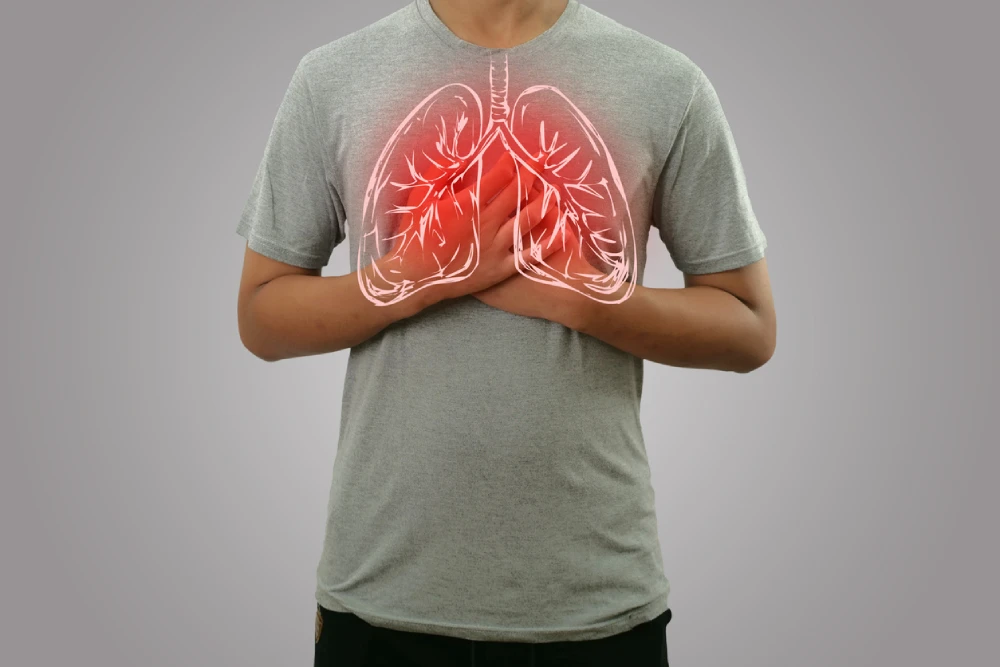Bronchitis is a common yet often misunderstood respiratory condition that can affect anyone at any time of year. Many people dismiss bronchitis as “just a bad cough,” but understanding its symptoms, causes, and treatment options is vital to recovery.
Whether you’re grappling with acute bronchitis after a bout of the flu or are managing chronic bronchitis, we’re here to shed some light on this condition.
Let’s dive into everything you need to know, including bronchitis treatment options, symptoms, prevention and when antibiotics may be necessary.
Understanding Bronchitis: Acute vs. Chronic
Bronchitis is characterized by inflammation of the bronchial tubes, which carry air to and from your lungs. This inflammation can lead to various symptoms, including coughing, mucus production, and shortness of breath, and can be classified in two distinct ways:
- Acute bronchitis
- Chronic bronchitis
Understanding which one you have is crucial, as the two forms differ significantly in cause, duration, and treatment.
Acute Bronchitis
Acute bronchitis is often referred to as a “chest cold” because it typically develops after a viral infection such as the common cold or flu, though the Canadian Lung Association explains it can also be the result of inhaling irritants, such as smoke or cleaners, or can even be the result of a bacterial infection.
Acute bronchitis usually lasts about 10–14 days, though a cough can persist for several weeks as the lungs heal.
Symptoms include a sore throat, wheezing, and fatigue, which may worsen with cold weather or pollution. While acute bronchitis is generally self-limiting, seeking proper care can speed up recovery and prevent complications.
Chronic Bronchitis
Chronic bronchitis, on the other hand, is a long-term condition that falls under the umbrella of chronic obstructive pulmonary disease (COPD). It is defined as a productive cough lasting most days over the course of three months, according to the Lung Health Association.
John Hopkins Medicine explains that the primary cause of chronic bronchitis is smoking, however, it’s also been found this condition can also stem from prolonged exposure to other lung irritants such as occupational chemicals.
Unlike acute bronchitis, chronic bronchitis requires ongoing management, often involving medications like bronchodilators and pulmonary rehabilitation.

3 Top Causes of Bronchitis
Identifying the cause of bronchitis is essential for determining the right treatment approach. From infections to environmental factors, understanding these triggers can help prevent or manage the condition effectively.
1. Viral Infections
Most cases of acute bronchitis are caused by viruses, such as the influenza virus or respiratory syncytial virus (RSV). These viruses spread through respiratory droplets when an infected person coughs or sneezes. Since antibiotics are ineffective against viral infections, treatment focuses on symptom relief.
2. Bacterial Infections
While bronchitis is caused by a virus 95% of the time according to Cleveland Clinic, bacterial infections can occasionally cause bronchitis, especially in people with weakened immune systems.
Common bacteria include Mycoplasma pneumoniae and Bordetella pertussis. In these cases, antibiotics like Clarithromycin or Azithromycin may be prescribed to combat the infection.
3. Environmental Triggers
Environmental factors play a significant role, particularly in chronic bronchitis. Long-term exposure to irritants like cigarette smoke damages the bronchial tubes, leading to inflammation and mucus production. Reducing exposure to these triggers is essential for prevention and management.
Bronchitis Symptoms – 5 Common Symptoms You Should Know
Bronchitis symptoms can vary depending on the severity and type of the condition. However, there are hallmark signs to watch for that can help you identify the need for medical attention.
- Persistent Cough with Mucus Production: A persistent cough is the most common symptom of bronchitis. The mucus, often referred to as phlegm, can be clear, white, yellow, or green, depending on the underlying cause.
- Shortness of Breath: Inflammation in the airways can make breathing more difficult, particularly during physical activity or in cold weather. This is more common in chronic bronchitis but can occur in acute cases as well.
- Prolonged Cough: While acute bronchitis typically resolves within two weeks, the cough may linger for up to eight weeks. Chronic bronchitis, on the other hand, involves a recurring cough that can last months at a time.
- Fever: A low-grade fever may accompany acute bronchitis, especially if caused by an infection. A higher fever could indicate pneumonia or another complication.
- Fatigue: Coughing and difficulty breathing can lead to poor sleep, leaving you feeling drained and fatigued.

Diagnosing Bronchitis: Tests and Medical Evaluation
Accurate diagnosis is crucial to distinguishing bronchitis from other respiratory conditions like pneumonia or asthma. Several tests and evaluations can confirm the presence and severity of bronchitis.
Your healthcare provider will generally begin by listening to your lungs for abnormal sounds like wheezing or crackles.
Some other common tests to diagnose bronchitis include:
- Nasal Swab: Identifies viral pathogens that might be causing your symptoms.
- Chest X-ray: Helps rule out pneumonia or other lung conditions.
- Blood Tests: Detects signs of infection.
- Sputum Tests: Analyzes mucus to identify bacterial infections.
- Pulmonary Function Test: Measures how well your lungs are working, particularly in chronic bronchitis cases.
Bronchitis Treatment & Therapies
Treating bronchitis often involves a combination of medications and lifestyle adjustments. Whether you’re dealing with a short-term infection or a chronic condition, the right treatment can help you recover faster and breathe easier.
- Cough Medicine or Suppressants: Over-the-counter (OTC) options like Dextromethorphan can help control a persistent cough, improving sleep and comfort.
- OTC Pain Relievers: For fever or chest discomfort, Acetaminophen and Ibuprofen are often recommended. For affordable, high-quality options, explore our For Your Everyday Option+ products at your local PharmaChoice pharmacy.
- Bronchodilators: Short-acting beta-agonists like Salbutamol relax airway muscles, making breathing easier. These are especially helpful for chronic bronchitis patients.
- Oxygen Therapy: For chronic bronchitis patients with low oxygen levels, oxygen therapy can improve quality of life and overall health.
- Pulmonary Rehabilitation Therapy: This involves exercise training, nutrition advice, and counselling to manage chronic bronchitis effectively.
Bronchitis Home Remedies
Home remedies can provide significant relief for bronchitis symptoms. These natural and practical solutions complement medical treatments and can support faster recovery.
- Drink Plenty of Fluids: Staying hydrated thins mucus, making it easier to expel.
- Get Enough Rest: Adequate sleep supports your immune system.
- Avoid Lung Irritants: Quit smoking and minimize exposure to pollutants. Talk to your PharmaChoice pharmacist about quitting aids to help you find success.
- Use Air Humidifiers: Adding moisture to the air can soothe irritated airways.
- Exercise: Light exercises like walking can strengthen chest muscles.
- Honey in Tea: A natural remedy to relieve cough and soothe the throat.
Bronchitis Prevention Tips
Preventing bronchitis is often easier than treating it. Taking steps to protect your lungs can significantly reduce your risk of developing this condition.
- Vaccinations: Annual flu shots and COVID-19 vaccines are essential to reduce the risk of respiratory infections. Talk to your local PharmaChoice pharmacist today about getting your flu shot.
- Avoid Irritants: Quit smoking, wear masks in polluted environments, and avoid allergens like dust and pollen.
- Personal Hygiene: Wash your hands frequently and avoid close contact with sick individuals during flu season.
- Improve Indoor Air Quality: Invest in air purifiers and reduce household pollutants to create a healthier breathing environment.
When to Seek Medical Attention
Knowing when to seek medical attention for bronchitis can prevent complications. Some symptoms should never be ignored, as they may indicate a more serious condition., such as:
- High fever over 39°C
- Cough lasting longer than three weeks
- Blood in mucus
- Severe shortness of breath

Learn More About Bronchitis Treatments at Your Local PharmaChoice Pharmacy
Bronchitis can disrupt daily life with its persistent cough and discomfort, but the right treatment can speed recovery. Whether you’re managing acute symptoms or a chronic condition, knowing your options is empowering.
For high-quality medications and personalized advice, visit your nearest PharmaChoice pharmacy today. Let us help you breathe easier!



